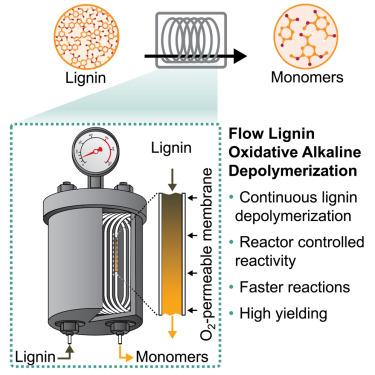用于木质素连续氧化解聚的透氧膜反应器
IF 38.6
1区 材料科学
Q1 CHEMISTRY, PHYSICAL
引用次数: 0
摘要
将木质素解聚成芳香族单体是生物质预处理过程中木质素价值化的最优先目标之一。在碱性条件下,木质素的氧化解聚可在高温与氧气的作用下迅速进行;然而,在相同条件下,芳香族产物很容易降解,从而使这些条件的实际应用变得复杂。在此,我们报告了一种使用透氧膜反应器的连续流有氧碱性木质素解聚方法。这种流动反应器可持续向碱性木质素溶液输送氧气,并精确控制温度和反应时间。反应时程分析可直接了解木质素解聚和单体分解的速率,从而实现工艺优化。在停留时间小于 4 分钟的情况下,可观察到高达 43 wt % 的芳香族产率。该工艺适用于来自不同生物质预处理方法、软木和硬木来源的多种木质素材料的解聚。本文章由计算机程序翻译,如有差异,请以英文原文为准。


O2-permeable membrane reactor for continuous oxidative depolymerization of lignin
Depolymerization of lignin into aromatic monomers is one of the highest priority targets for valorization of lignin obtained from biomass pretreatment. Oxidative lignin depolymerization proceeds rapidly under alkaline conditions at elevated temperature with O2; however, the aromatic products are susceptible to degradation under the same conditions, complicating practical application of these conditions. Here, we report a continuous-flow aerobic alkaline lignin depolymerization method using an O2-permeable membrane reactor. The flow reactor allows for continuous oxygen delivery to the alkaline lignin solution and precise control of the temperature and reaction time. Reaction time-course analysis provides direct insights into the rates of lignin depolymerization and monomer decomposition, enabling process optimization. Aromatic yields up to 43 wt % are observed with a residence time of less than 4 min. This process is applied to the depolymerization of multiple lignin materials derived from different biomass pretreatment methods and from both softwood and hardwood sources.
求助全文
通过发布文献求助,成功后即可免费获取论文全文。
去求助
来源期刊

Joule
Energy-General Energy
CiteScore
53.10
自引率
2.00%
发文量
198
期刊介绍:
Joule is a sister journal to Cell that focuses on research, analysis, and ideas related to sustainable energy. It aims to address the global challenge of the need for more sustainable energy solutions. Joule is a forward-looking journal that bridges disciplines and scales of energy research. It connects researchers and analysts working on scientific, technical, economic, policy, and social challenges related to sustainable energy. The journal covers a wide range of energy research, from fundamental laboratory studies on energy conversion and storage to global-level analysis. Joule aims to highlight and amplify the implications, challenges, and opportunities of novel energy research for different groups in the field.
 求助内容:
求助内容: 应助结果提醒方式:
应助结果提醒方式:


